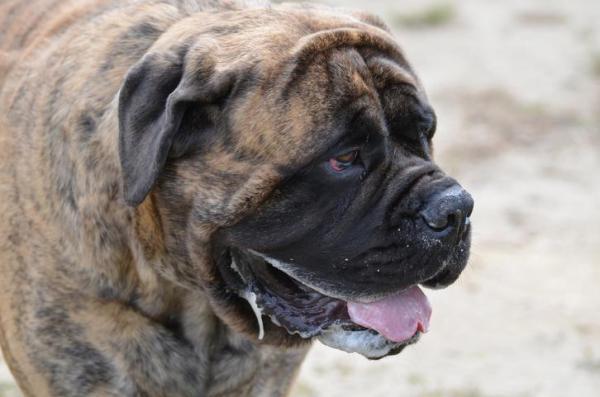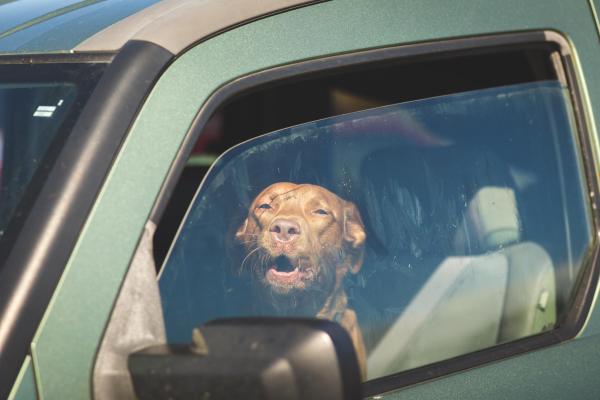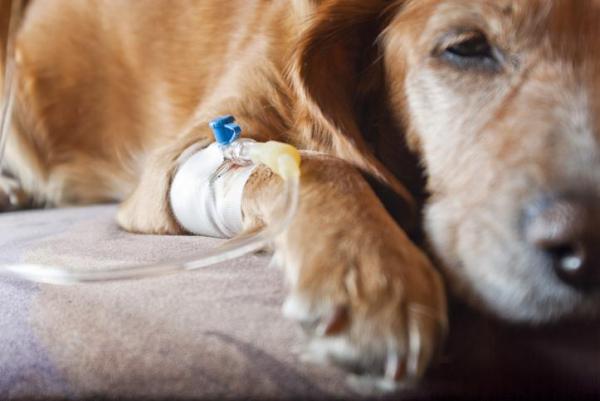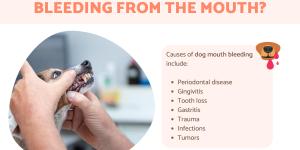My Dog's Mouth is Dry



See files for Dogs
Different dogs have varying capacities for drooling. Much of this has to do with the shape of their mouths. However, the amount and consistency of any dog's saliva can reveal something about their health and well-being. If a dog's mouth is dry, their saliva will be thick and sticky. It is unlikely thick and sticky saliva will be present on its own, rather it will be one of a range of symptoms describing a given clinical picture. These symptoms could be either fairly benign or part of a serious medical condition such as dehydration or even heat stroke.
In this AnimalWised article, we discuss what happens when your dog's mouth is dry. While we will show you how to identify these disorders, it is imperative you take the dog to a veterinarian to achieve a proper diagnosis.
My dog is dehydrated
Dry mouth is not a disease in and of itself, but a symptom of a larger problem. Scientifically known as xerostomia, dry mouth manifests in a lack of moisture in the oral cavity. The tongue will become dry, little saliva is produced and the saliva that is present is thick and viscous.
The main cause of a dog's mouth being dry with thick and sticky saliva is dehydration. When a dog is dehydrated, their body loses more fluids than it can replace. In these cases, water is lost from the body, along with essential electrolytes. Dehydration can occur when a dog vomits profusely or suffers from severe diarrhea. There are various causes of vomiting and diarrhea in dogs, including gastroenteritis or infectious diseases such as canine parvovirus.
My dog does not drink water
Another reason a dog becomes dehydrated is not because they lose fluid rapidly, but because they do not manage to intake as much water as they require. This clinical picture can occur when the dog has a high fever, preventing the dog from being able to drink. Other serious illnesses can also manifest in lethargy which stops the dog from drinking. Heat stroke is one such illness, although this combines with rapid fluid loss, something we'll learn more about in the next section.
There may be a practical, yet no less serious, reason why a dog is unable to drink and develops xerostomia (dry ,outh). Inflammation or even the presence of a foreign object stuck in the throat can prevent the dog from drinking water. This is something which not only causes a dry mouth and dehydration, but it threatens to obstruct their airway. An obstructed airway is potentially life threatening and requires immediate intervention.
For further information, read our article on reasons why your dog does not eat or drink.
Symptoms of a dehydrated dog
If we see our dog has a dry mouth and suspect they are dehydrated, there is a test you can do. Take a fold of skin from the dog at their withers and stretch it carefully. When released from your grip, the skin should return to its original position immediately. If it takes more time, this is an indication the dog is suffering a certain degree of dehydration. Other signs of dehydration include:
- Dry mouth
- Residue on gums
- Thick saliva
- Dry spittle around lips
- Sunken eyes
In the most severe cases, or if the dog is not treated promptly, they may go into shock and die. If you find yourself in an emergency, our article on homemade solution for dehydrated dogs. Take them to the vet as soon as you can, whether or not they have had this solution.
When a dog has a dry mouth and is not producing much saliva, there are other problems. A dog's saliva contains many proteins which serve various purposes such as maintaining mineralization of the teeth, defending tissues and buffering the mouth against disease[1]. If the mouth is not rehydrated soon, then it makes the dog vulnerable to further disease and health risks.
My dog has heat stroke
Heat stroke is a very dangerous cause of dry mouth in dogs. It is considered a veterinary emergency. Elevation in body temperature in a hot environment leads to heat stroke. the ambient temperature doesn't allow the dog to cool down as they normally do so by evaporating air through panting. When the dog's core body temperature and the ambient temperature are similar, the dog is unable to lose heat. If the dog maintains this very high temperature, it is possible they will die.
Perhaps the most referenced reason for a dog getting heat stroke is when they are left in a car on a hot day with the windows closed. However, heat stroke can also occur after exercise in hot weather, a disease which makes breathing difficult, a high fever, etc. Additionally, brachycephalic dog breeds tend to suffer from this problem more often due to their shortened palate and flattened snout.
Symptoms of heat stroke in dogs
Signs of heat stroke in dogs include:
- Intense gasping for air
- Difficulty breathing
- Vivid dark mucous
- Tongue discoloration
- Dry, thick and sticky saliva
- Vomiting
- Fever
- Diarrhea with blood
- Shock
Finally, if heat stroke is not treated promptly and it is not possible to reduce the dog's temperature in time, it is possible the results can be fatal.

Side effects of medication
As we state above, it is possible a dog will develop a dry mouth as a symptom of another disease. However, it is also possible that treatment of a certain disease can result in dehydration. Certain drugs or medications give side effects which include xerostomia.
Some people wonder does Claritin causes dry mouth in dogs? Dry mouth is indeed a side effect of Claritin, an antihistamine drug for allergies. However, this does not mean you should give over-the counter medication to dog without checking with your veterinarian first. Even similar types of drug will have varying ingredients some of which are toxic to dogs.
Cancer treatment such as radiotherapy can also have a dry tongue and mouth as a side effect. However, the veterinarian will need to manage all of the dog's symptoms in cases like these.

What to do if my dog has a dry mouth
When a dog's mouth is dry with a cracked tongue and thick saliva, it is not a good sign. While it is possible the dog simply needs some more access to water, the clinical picture can worsen. You should not waste any time getting to the veterinarian. The dog may not be able to drink fluid on their own or they will be so dehydrated that fluid therapy will need to be carried out intravenously.
Less serious cases of canine dehydration may only need a fluid solution introduced orally. However, if the dog is vomiting or has any other complications, this may not be possible. Taking the dog to a veterinarian can means problems are best able to be troubleshooted.
The veterinarian must also determine the reason for a dog's dry mouth to treat the underlying cause. The cause of a lack of fluid or the reason for a lack of water intake may be very serious in and of itself. In the case of heat stroke the situation is serious. During he trip to the veterinarian you will need to keep them as cool as possible, ideally in an air conditioned vehicle.
If the dog has had an adverse reaction to a certain medication, then veterinary treatment is also essential. They may need to have their stomach pumped and treatment for any other damage which may have been incurred.

This article is purely informative. AnimalWised does not have the authority to prescribe any veterinary treatment or create a diagnosis. We invite you to take your pet to the veterinarian if they are suffering from any condition or pain.
If you want to read similar articles to My Dog's Mouth is Dry, we recommend you visit our Other health problems category.
1. Sanguansermsri, P., et al. (2018). Comparative Proteomic Study of Dog and Human Saliva. PlosOne, 13(12), e0208317.
https://journals.plos.org/plosone/article?id=10.1371/journal.pone.0208317
- Carlson and Giffin. (2002). Practical canine veterinary manual . Madrid. Editorial el Drac.







